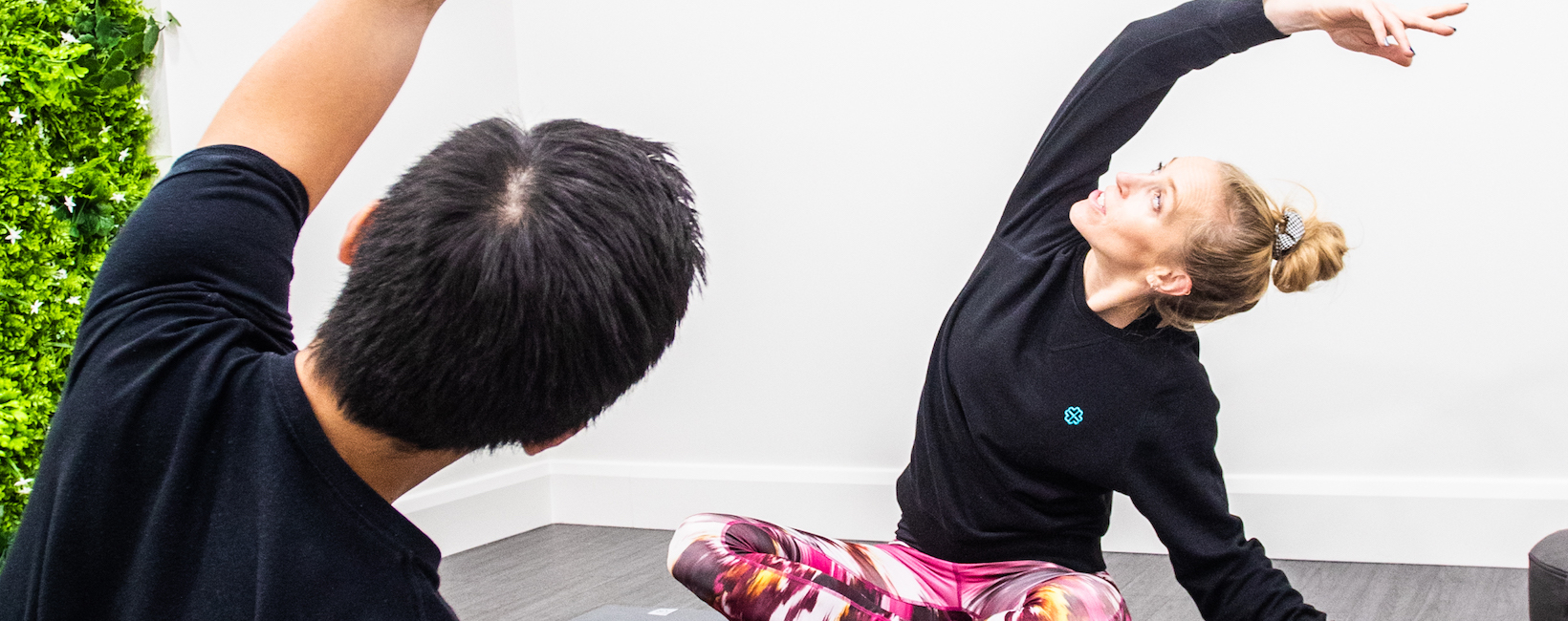
Why Practice Yoga?
So why Yoga at Coyne…and what is it?
We have always believed that ‘wellness’ is not just about curing illness and relieving symptoms. It is also about preventing sickness and striving to be being as fit and healthy as we can in both mind and body. To enable our patients to be just that, we have launched a new range of wellness services. These will support our medical team to create our very own Healthcare Ecosystem. Have you noticed our new Yoga and Meditation room at 660 Fulham Road…here’s what’s inside!
What is Yoga at Coyne? what would I do in a yoga lesson?
Yoga is available to everyone, whatever your age, size and fitness level. The practice of yoga can take so many different forms it can be confusing to know what Yoga actually is. Yet, everyone has heard of it and you probably know someone that does it.
There are a good deal of myths about yoga. These myths include ‘it’s only for flexible people’, ‘it’s boring’, ‘it’s not real exercise’, and yes, these are all untrue! So, let’s break down what Yoga actually is and how it could help you lead a calmer, fitter, more balanced life. With escalating worries and anxiety around Covid-19, never before have we needed to focus on self-care and mental wellness so much.
–Breathing: We do it all day, every day and rarely think twice about it. But understanding the power of your breath and how it can help you with your relaxation is vital to optimal health. With a greater understanding of how your inhalation and exhalation can support your body’s ‘resting’ mode, you can learn to trigger your very own relaxation response even at the most stressful times of the day.
With a considered exhale we slow our heart rate, reduce muscle tension and blood pressure, we improve our digestion and support our immune system function. As we learn to inhale deeply, we strengthen the lungs and surrounding thoracic musculature. This also minimizes strain on the neck and upper back and improves our energy and concentration. Learning new breathing techniques can also help us at times of stress, anger and fear. Breathing techniques can also help with sleeping issues, anxiety and grief.
– Mindfulness: Becoming aware of our own thoughts and actions might seem like second nature. But when we practice mindfulness through yoga, we use the sense of connecting our physical bodies to the ground to connect to the present moment. As we anchor ourselves and pull ourselves into the ‘now’, we learn to calm our emotions and physical sensations. Our attention diverts from worries, thoughts and anxieties. The more we develop these skills, the more we can use them away from the yoga space. They can be used in our everyday lives and through the more challenging moments of our day.
–Physical Movement: When did we stop crouching down, balancing on one leg or getting up and down from the floor as we did as children? When did ‘sitting’ become our most common anatomical position? These are all questions we should ask ourselves.
Through the practice of a specific style of yoga known as Vinyasa Yoga, you can begin to explore your body’s ability to move. Vinyasa essentially means a ‘flowing aerobic style of yoga that synchronizes body movements with the breath.’
It involves progressively learning to move, strengthen and stretch our bodies.
Vinyasa occurs in an impact-free, dynamic way. It gradually increases our muscle tone and capability, balance, range of movement and flexibility.
Vinyasa yoga taught at an upbeat pace can also provide a fantastic form of exercise working with your body weight and good alignment. It will also work into specific areas of the body. Especially those tight through over-exertion, past-injury or poor postural habits.
A slower gentler pace of movement can be practiced with Hatha Yinyasa Yoga. Hatha Yinyasa places s greater emphasis on holding postures for a longer period of time. This allows for deeper stretching and relaxation. It is ideal for injury rehabilitation as well as for those who are seeking a more Restorative based yoga session to deal with anxiety and exhaustion. Supporting props such as chairs, blocks and bolsters are often incorporated to assist the body in movement.
So who can practise Yoga?
Yoga at Coyne is for everyone…a few of our suggestions are…
-Teens who have stopped taking their ballet and gym lessons who want to still work on their flexibility and posture but in a new dynamic environment
-Post-Natal and new parents who need a nurturing form of gentle exercise that also focuses on relaxation and meditation. There is plenty of room for a buggy in our yoga room!
-If you have suffered injuries in the past and want to continue exercising but need to build strength and flexibility in key areas and bring a sense of balance back to your body.
-Anyone who spends the majority of time sitting down who wants to get back in control of their body movement and improve their posture and back health.
-Couples who are looking for a fun activity to do together that is non-competitive and will benefit them as much on the mat as off
-Those who are dealing with high-stress levels and anxiety and major life changes
If you are interested in yoga and how it could create a positive change in your life, please do contact our yoga and body movement teacher, Nics at Yoga@coynemedical.com